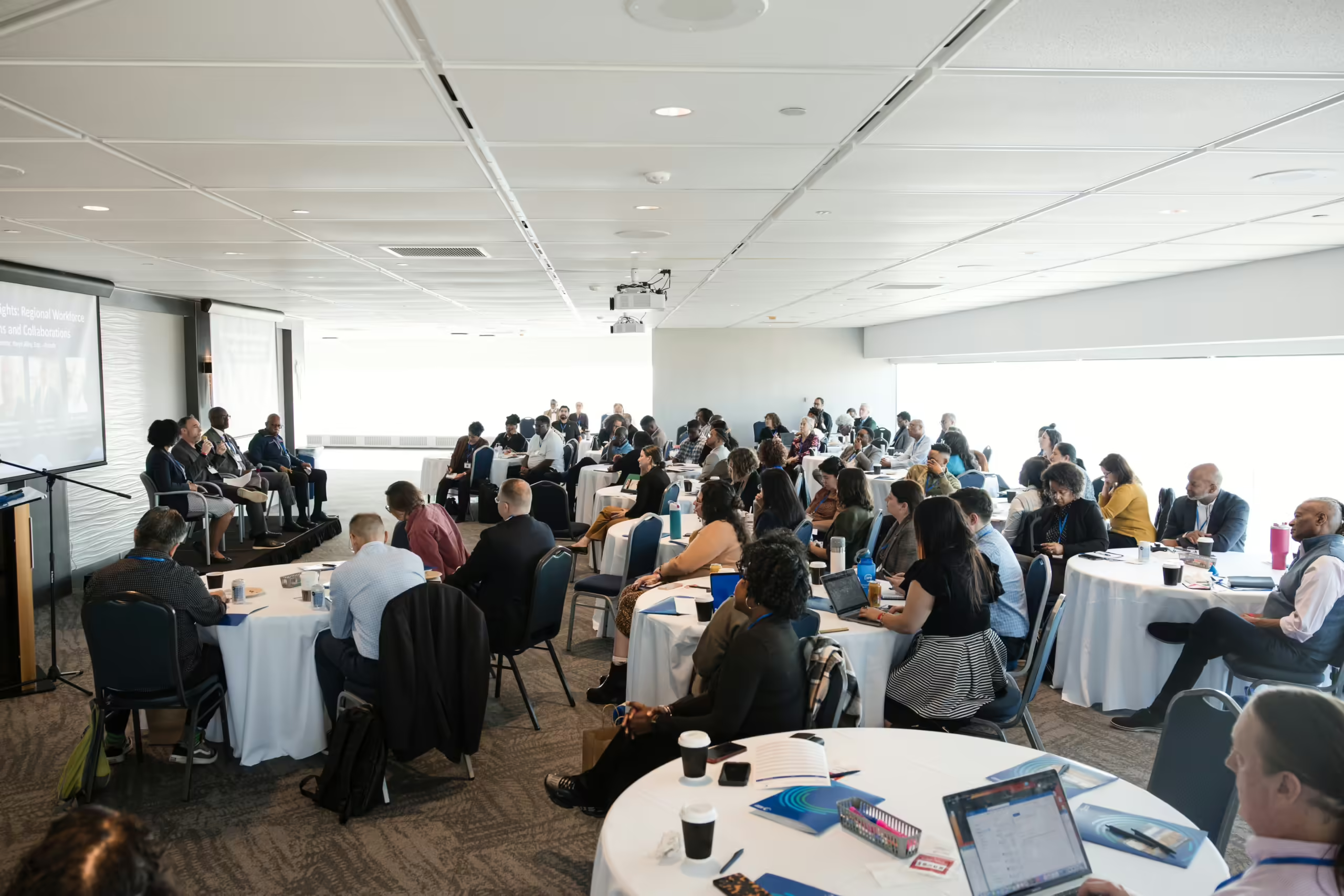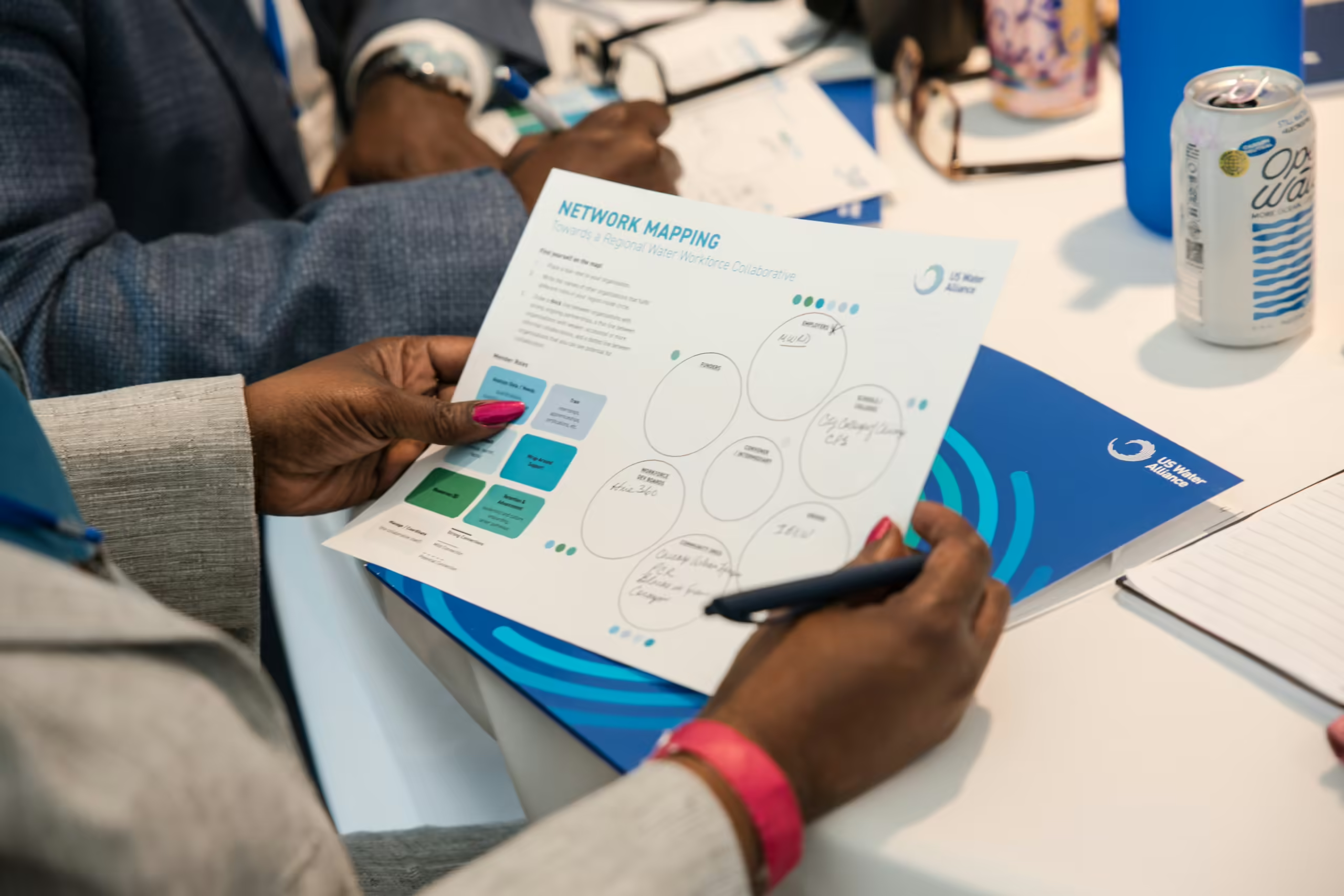Our nation’s water utility workforce serves communities, supports environmental health, and is essential to thriving local economies. Despite being a stable, mission-oriented industry offering family-sustaining jobs with opportunities for wealth-building, many utilities face a current workforce quantity and quality crisis. A massive wave of retirements is depleting employee ranks and leaving critical jobs unfilled, with an additional one-third of the workforce eligible to retire in the next decade. Irreplaceable know-how is at risk of being lost rather than transferred to the next generation of utility workers. The current water workforce composition also reveals gender and racial disparities. Addressing these complexities requires water leaders to think and act differently than in generations past.
 That’s why in October, the US Water Alliance convened our fourth and final One Water Leadership Institute of 2024 in Baltimore on Effective and Equitable Water Workforce Solutions, co-hosted in partnership with Baltimore City Department of Public Works and WSSC Water. Over two days, more than 80 participants explored local and regional workforce strategies and gained tangible takeaways for building a stronger and more equitable water workforce in their own communities. They also networked and built relationships with peers and leaders from across the sector, discussed innovations to building talent pipelines, and honed their own One Water Change Leadership capacities to apply these principles to their workforce development journey.
That’s why in October, the US Water Alliance convened our fourth and final One Water Leadership Institute of 2024 in Baltimore on Effective and Equitable Water Workforce Solutions, co-hosted in partnership with Baltimore City Department of Public Works and WSSC Water. Over two days, more than 80 participants explored local and regional workforce strategies and gained tangible takeaways for building a stronger and more equitable water workforce in their own communities. They also networked and built relationships with peers and leaders from across the sector, discussed innovations to building talent pipelines, and honed their own One Water Change Leadership capacities to apply these principles to their workforce development journey.
The Institute focused on the key elements and strategies of successful water workforce programs and partnerships. WSSC Water and Baltimore City Department of Public Works (DPW) shared the workforce challenges facing their utilities and communities along with the innovative programs and partnerships they have developed to meet these needs. Working with trusted partners toward the same goal and taking the time to listen to community needs became a clear critical component of the conversation around creating successful partnerships.
WSSC Water and Baltimore DPW are working with community partners like Morgan State University, an HBCU, and Employ Prince George’s, a workforce development nonprofit, to fill gaps in their workforce development programming, including creating career pathways and providing training. Morgan State University is building social justice by connecting students and youth with technical careers at water utilities while Employ Prince George’s is reducing the wealth gap by connecting “untapped audiences” with the support and guidance to qualify for and apply to water utility jobs. Through these partnerships, these organizations are working to improve the wealth gap by providing sustainable wages and sustainable careers.
We also heard from sector leaders on how their water workforce programs are filling vacant jobs with a diverse workforce that’s prepared for the many challenges that the sector faces:
- PowerCorpsPHL provides paid experience and career training in and out of the water sector to young adults in Philadelphia. By partnering with the Philadelphia Water Department, participants help complete public works projects while gaining valuable skills that can funnel into water utility careers. PowerCorpsPHL supports the utility in engagement, recruitment, and training.
- AlexRenew’s state-recognized Wastewater Apprenticeship program provides classroom and on-the-ground training that can funnel into a career at AlexRenew or other nearby utilities. AlexRenew’s staff of approximately 100 employees includes over 20 alumni of their apprenticeship program.
- Baltimore City DPW’s YH2O+ is a career training program that prepares young adults with the right skills to fill entry-level positions in the water and solid waste industries.
 Toward Regional Water Workforce Collaboratives
Toward Regional Water Workforce Collaboratives
Regional Water Workforce Collaborative efforts, such as Jersey Water Works, BayWork, and Inland Empire Works (the latter two supported by Jewish Vocational Services), are a notable workforce strategy because of the scale and depth of results they can achieve. Jewish Vocational Services (JVS) presented on how a collaborative goes beyond what one organization can do by themselves by creating a structure that pools together member resources to advance a shared regional workforce vision. Collaboratives are most successful when they start with a clear goal, bring in the right people, establish shared priorities and a formalized charter, ensure capacity, and agree on where to start.
Led by WSSC Water in partnership with Baltimore DPW, the Chesapeake Water Workforce Network is an emerging regional water workforce collaborative. The dream for this collaborative is a vibrant and varied water workforce that uplifts underserved and underemployed communities through connection to stable, well-paying, and purposeful careers. Collaboratives involve pooling and sharing resources and scaling best workforce practices within a region so utilities don’t have to go it alone or recreate the wheel. Additional partners include Howard County, regional HBCUs, community-based organizations, workforce hubs, the Teamsters Union, and others. WSSC’s leadership to drive and spread positive change resulted in the formation and funding of the collaborative. As anchors of the collaborative, WSSC Water and Baltimore DPW are currently working to develop an MoU and are considering factors like cost-sharing and governance.
 The US Water Alliance is grateful to the thought leaders from across our network who shared inspiring successes, challenges, and lessons learned on their journey to creating effective and equitable water workforce solutions. We thank you all for coming together to make connections and make commitments toward building a strong and equitable water workforce both in your own local communities and across the nation!
The US Water Alliance is grateful to the thought leaders from across our network who shared inspiring successes, challenges, and lessons learned on their journey to creating effective and equitable water workforce solutions. We thank you all for coming together to make connections and make commitments toward building a strong and equitable water workforce both in your own local communities and across the nation!
“This was a transformational “unconference.” I am leaving empowered and energized to build a more equitable workforce and strengthen our partnerships. I’ve met brilliant people, and I’m looking forward to implementing what I’ve learned these past two days.” –institute participant


